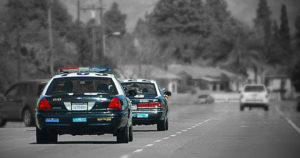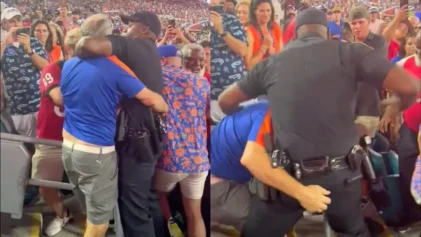It’s no secret that Blacks are more likely to be stopped and frisked by police or to die in police custody than other groups. Now a new study has found that African-Americans are twice as likely as whites to be exposed to non-lethal force during police interactions.
The study examined millions of police encounters over a decade and found that even when police don’t actually use force against Blacks, they’re more likely to threaten to use force against them. This finding is especially stunning given that African-Americans have fewer encounters with police than whites do, according to the study.
During a typical year, 20 percent of white Americans, roughly 33 million, interact with police. This compares to 17 percent, or nearly 5 million, of African-Americans and 16 percent, or 4.4 million, of Latinos. These figures come from surveys taken in 2002, 2005, 2008 and 2011 of people stopped by police or who interacted with police after requesting help or taking part in criminal investigations. The numbers didn’t drastically change over the years.
Street stops outweigh traffic stops as the police encounters most likely to result in force or the use of force against Blacks. During police stops, Blacks were also more likely to be searched. Regarding force in particular, government researchers found that 3.5 percent of Blacks said that during their most recent police encounters, officers “shouted, cursed, threatened, pushed, grabbed, hit or kick them; used pepper spray or a Taser; or pointed a gun or used some other form of force.”
Just 1.4 percent of white people and 2.1 percent of Hispanic people reported the same kind of abusive treatment from police, according to the police-public contact survey by the Justice Department’s Bureau of Justice Statistics.
The survey isn’t completely scientific, as survey respondents themselves determined what they considered to be force. That said, a reasonable person can distinguish force from appropriate conduct. A tap on the shoulder is not an aggressive act but shoving someone to the ground is. And it goes without question that Tasering or pointing a gun at a civilian constitutes aggression.
It’s appalling but not at all surprising that African-Americans disproportionately face such treatment from police. While bigots will likely argue that Blacks simply warrant more police force, that idea overlooks the fact that not all of the survey respondents were suspects or criminals. Some of these people actually called police for help, only to wind up on the receiving end of abuse from the authorities.
The results of this eye-opening study follows the Guardian’s rolling investigation into police misconduct that found Blacks die at the hands of police twice as much as whites do. Moreover, Blacks who die in police killings are twice as likely to be unarmed than their white counterparts.
Another recent report examined the intersection of race and policing in California. It found that although Blacks make up just 6 percent of the Golden State’s population, they account for 17 percent of people arrested and nearly a quarter of individuals who die in police custody. Other studies conducted on this subject would also arguably arrive at the conclusion that Blacks are too often targets of the criminal justice system. But what measures can be taken to change matters?
Apparently, racial sensitivity training is not enough. Law enforcement agencies already provide such training. And community outreach doesn’t appear to have made a difference either. Perhaps police departments need to do a better job of screening candidates and educating them about racial biases. A Black civilian doesn’t deserve to be bullied, injured or killed any more than a white civilian does. Police don’t have the right to treat any Black person they stop as a hardened or dangerous criminal.
The authorities exist to enforce the law, not to abuse it or the people they serve.



